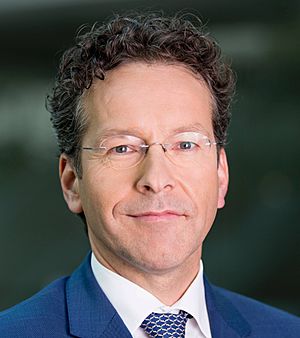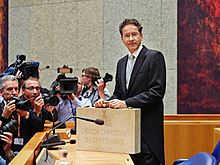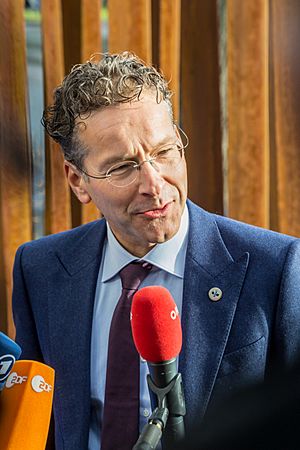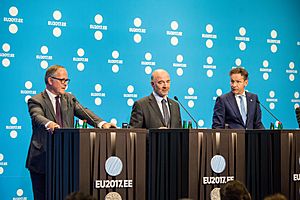Jeroen Dijsselbloem facts for kids
Quick facts for kids
Jeroen Dijsselbloem
|
|
|---|---|

Dijsselbloem in 2015
|
|
| Mayor of Eindhoven | |
| Assumed office 13 September 2022 |
|
| Preceded by | John Jorritsma |
| Chairman of the Dutch Safety Board | |
| In office 1 May 2019 – 13 September 2022 |
|
| Preceded by | Tjibbe Joustra |
| Succeeded by | Vacant |
| President of the Eurogroup | |
| In office 21 January 2013 – 12 January 2018 |
|
| Preceded by | Jean-Claude Juncker |
| Succeeded by | Mário Centeno |
| Minister of Finance | |
| In office 5 November 2012 – 26 October 2017 |
|
| Prime Minister | Mark Rutte |
| Preceded by | Jan Kees de Jager |
| Succeeded by | Wopke Hoekstra |
| Leader of the Labour Party in the House of Representatives | |
| In office 20 February 2012 – 20 March 2012 |
|
| Preceded by | Job Cohen |
| Succeeded by | Diederik Samsom |
| Member of the House of Representatives | |
| In office 23 March 2017 – 25 October 2017 |
|
| In office 20 November 2002 – 5 November 2012 |
|
| In office 28 March 2000 – 23 May 2002 |
|
| Personal details | |
| Born |
Jeroen René Victor Anton Dijsselbloem
29 March 1966 Eindhoven, Netherlands |
| Political party | Labour |
| Domestic partner | Gerda Grave (1992–present) |
| Children | 1 son 1 daughter |
| Education | Wageningen University (ir.) University College Cork |
Jeroen René Victor Anton Dijsselbloem (born 29 March 1966) is a Dutch politician and economist. He has been the Mayor of Eindhoven since September 13, 2022. Before this, he held several important positions in the Dutch government and in Europe. He is a member of the Labour Party (PvdA). Since April 1, 2019, he has also been the Chairman of the supervisory board of Wageningen University.
From 2012 to 2017, Dijsselbloem was the Minister of Finance for the Netherlands. He also led the Eurogroup from 2013 to 2018. The Eurogroup is a meeting of finance ministers from countries that use the euro currency. He was also the Chairman of the Dutch Safety Board from 2019 to 2022.
Contents
Early Life and Education
Jeroen Dijsselbloem was born in Eindhoven, Netherlands, on March 29, 1966. Both of his parents were schoolteachers. He grew up in a Roman Catholic family.
He attended primary school in Son en Breugel and secondary school in Eindhoven. From 1985 to 1991, he studied at Wageningen University. He earned a degree in agricultural economics. He focused on business economics and agricultural policy. After that, he did research at University College Cork in Ireland.
Political Journey
Jeroen Dijsselbloem became interested in politics around 1983. This was a time when many young people in the Netherlands protested against certain missiles. In 1985, he joined the Labour Party (PvdA).
From 1993 to 1996, he worked for the Labour Party's group in parliament. He was also a member of the local council in Wageningen from 1994 to 1996. Later, he worked at the Ministry of Agriculture, Nature and Fishery.
From 2000 to 2012, Dijsselbloem was a member of the House of Representatives for the Labour Party. This is like being a member of parliament. He briefly left after the 2002 elections but returned later that year. In 2007, he led an investigation into education reform. He focused on topics like youth care and special education.
Minister of Finance (2012–2017)
On November 15, 2012, Jeroen Dijsselbloem became the Minister of Finance in the Dutch government. He was part of the Second Rutte cabinet. As Minister of Finance, he focused on keeping government spending under control.
In February 2013, he took over a financial institution called SNS Reaal to prevent it from going bankrupt. This was a big step to protect the country's financial system. By December 2013, the Dutch press named him "politician of the year." They described him as smart and good at finding solutions.
He finished his term as Minister of Finance on October 26, 2017. Wopke Hoekstra took over his role.
Leading the Eurogroup (2013–2018)
On January 21, 2013, Dijsselbloem became the President of the Eurogroup. This group includes the finance ministers from countries in the Eurozone, which are countries that use the euro currency. He took over from Jean-Claude Juncker.
Early in his term, he faced challenges, especially during the financial crisis in Cyprus in March 2013. He helped negotiate a plan to rescue banks there. He explained that financial institutions and investors needed to understand the risks they were taking.
As the Eurogroup head, Dijsselbloem also worked with Greece during its financial difficulties. He represented the European countries that were helping Greece with bailout packages. These were loans to help Greece's economy. After a public vote in Greece in July 2015, a new bailout deal was finally agreed upon.
In July 2015, Dijsselbloem was reappointed for a second term as President of the Eurogroup. He promised to work on reforms to help the euro currency union run smoothly. On December 4, 2017, Mário Centeno was chosen as his successor.
Discussion on Responsibility
In March 2017, Dijsselbloem made comments about how countries manage their finances. He emphasized that countries receiving financial help also have responsibilities. He said that support from other countries is not just a gift. Instead, it comes with conditions to help countries get their finances in order.
His comments caused strong reactions from some European leaders. They felt his words were not respectful. In response, Dijsselbloem clarified his message. He said he was sorry if his choice of words caused offense. However, he stood by the idea that countries must be responsible with their money. He believed that agreements must be kept for the Eurozone to work well.
Other Activities
Jeroen Dijsselbloem has also been involved in several international and non-profit organizations.
International Organizations
- Asian Infrastructure Investment Bank (AIIB): He was a member of the Board of Governors from 2016 to 2017.
- European Bank for Reconstruction and Development (EBRD): He was a member of the Board of Governors from 2012 to 2017.
- European Investment Bank (EIB): He was a member of the Board of Governors from 2012 to 2017.
- World Bank: He was a member of the Board of Governors from 2012 to 2017.
Non-profit Organizations
- World Economic Forum (WEF): He has been a member of the Europe Policy Group since 2017.
Personal Life
Jeroen Dijsselbloem lives in Wageningen with his partner, Gerda Grave. They have a son and a daughter.
See also
 In Spanish: Jeroen Dijsselbloem para niños
In Spanish: Jeroen Dijsselbloem para niños
 | William L. Dawson |
 | W. E. B. Du Bois |
 | Harry Belafonte |




